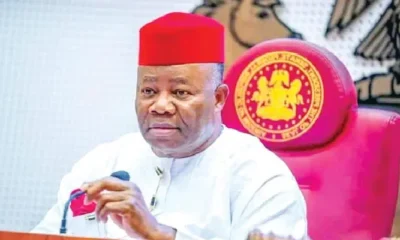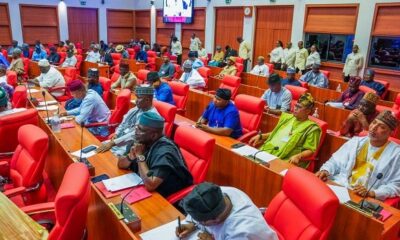News
Senate Leader defends National Assembly against ‘Rubber-Stamp’ allegations

The Leader of the Senate, Senator Opeyemi Bamidele, has rejected claims by opposition parties that the National Assembly operates as a rubber-stamp institution, describing such allegations as unfounded and unsupported by facts.
In a statement issued on Sunday by the Directorate of Media and Public Affairs, Office of the Senate Leader, Bamidele, who represents Ekiti Central, argued that if the claims were accurate, the legislature would not have held over 39 engagements with the executive arm to resolve contentious issues surrounding the 2024 Tax Reform Bills before their eventual passage.
He stated: “If we were indeed a rubber-stamp parliamentary institution, as most opposition parties have alleged, the bills would have been passed within a week or two of being laid before us. In reality, the executive and legislative arms held more than 39 meetings to resolve grey areas in the 2024 Tax Reform Bills before they were passed by both chambers of the National Assembly.”
Bamidele emphasised that the legislative process was far from rushed, highlighting its thoroughness and the inclusion of stakeholders from across the country. He noted that the National Assembly spent nearly six months securing public input and resolving issues, including through public hearings, consultations with industry leaders, and behind-the-scenes negotiations.
“We extended our engagements to captains of industry to ensure the tax reform bills we passed would stand the test of time, meet the needs of the people, and serve the overriding public interest in the discharge of our constitutional duties,” he added.
The Senate Leader expressed concern that, despite the extensive efforts of lawmakers, much of the public remained unaware of the work being done and were quick to criticise the Assembly whenever bills originated from the executive. He stressed that, contrary to popular belief, the 10th National Assembly had adopted a strategic and collaborative approach to governance since its inauguration on 13 June 2023.
He observed that leading opposition parties, including the Peoples Democratic Party (PDP), Labour Party (LP), and New Nigeria Peoples Party (NNPP) – had repeatedly accused the legislature of subservience to the executive without acknowledging the level of scrutiny and diligence applied to its decisions.
Bamidele further cited the 2025 Appropriation Act as an example. Although the bill was presented on 18 December 2024, it was only passed on 13 February 2025. He argued that, had the legislature been rubber-stamping executive proposals, the budget would have been hastily passed before the end of the 2024 fiscal year to preserve the January-to-December cycle.
“We did not return the budget to the executive until February 2025. We exercised thorough due diligence. Every committee of the National Assembly engaged extensively with agency heads to properly scrutinise the budget, again in the public interest,” he said.
Bamidele concluded by reaffirming the National Assembly’s unwavering commitment to the Nigerian people, maintaining that all legislative activities are guided by the principles of good governance and the protection of the public interest.
-

 News4 hours ago
News4 hours agoOpposition Reps raise alarm over alleged non-implementation of 2025 budget
-

 Business4 hours ago
Business4 hours agoCurrency outside Banks rises 10.2% as money supply expands
-

 World News4 hours ago
World News4 hours agoNigeria’s exports to Africa hits N4.82trn
-

 National News4 hours ago
National News4 hours agoClean Energy key to survival, healthy living — Remi Tinubu
-

 Metro4 hours ago
Metro4 hours agoPolice Inspector killed as officers rescue kidnap victim in Oyo
-

 News35 minutes ago
News35 minutes agoBREAKING: Soludo orders closure of Onitsha Main Market over sit-at-home defiance

























